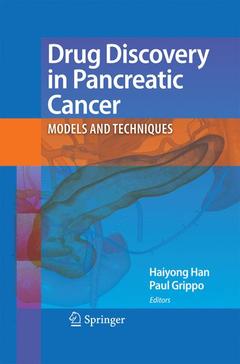Drug Discovery in Pancreatic Cancer, 2010 Models and Techniques
Coordonnateurs : Han Haiyong, Grippo Paul

Pancreatic cancer is the fourth leading cause of cancer death in the United States. Every year, about 33,700 people in the United States will be diagnosed with pancreatic cancer and over 32,000 patients will die from the disease. The median survival of patients with advanced pancreatic cancer is about 6-months. This dismal picture of pancreatic cancer is mainly due to the lack of early diagnosis and effective treatment for patients with advanced disease. To increase the survival rate of pancreatic cancer patients, better tumor markers for diagnosis and new molecular targets for drug development are desperately needed. A lot of effort has been made in searching for pancreatic cancer-causing genes or genes associated with progression of malignant behavior in pancreatic cancer. As a result, alterations in the expression of several cancer-related genes have been identified in pancreatic tumors. The identification and characterization of these cancer-related genes have significantly increased our understanding of pancreatic cancer development, but unfortunately the treatment of pancreatic cancer has not advanced as much in the past 20 years.
Over the past decade, tremendous advances have been made in the field of cancer drug discovery, particularly, in the area of molecular and genetic models and technologies. Many of those advanced models and technologies have been applied to the drug discovery processes for pancreatic cancer. In this book, a team of experts will describe the latest development in the application of these models and technologies in pancreatic cancer. The authors include basic researchers as well as clinicians who work in the front-line of the war against pancreatic cancer and have the first-hand experience on these cutting-edge tools and techniques. The book can be divided into two general areas: 1) model systems and 2) genomics and proteomics tools. In recent years there have been a lot of advances in the model systems for pancreatic cancer, including the further characterization of normal and cancerous pancreatic cell lines, the establishment of transgenic mouse models that recapitulate the initiation and progression of human pancreatic cancer, the development of a new xenograft model system for the evaluation of novel agents, and the establishment of a zebrafish pancreatic cancer model. The first four chapters of the book will be devoted to these models. The advances in genomics and proteomics research have made a major impact in cancer drug discovery. A number of these ?omics-based tools and techniques have been applied in the pancreatic cancer drug discovery. Chapters 5-9 of the book will discuss techniques for genome-wide examination of gene expression, copy number, methylation, function and regulation. Chapters 10-11 will discuss in situ techniques for studying chromosomal and gene copy number abnormalities as well protein expression changes in cancer samples. Chapters 12-14 will focus on techniques for global examination of protein expression levels in biospecimens obtained from pancreatic cancer patients. Cancer drug discovery has become more and more target-centric.
This has made the development of pharmacodynamic endpoint assays and the small animal imaging models ever more important
The last two chapters of the book will review the recent developments in this area
Date de parution : 11-2014
Ouvrage de 297 p.
15.5x23.5 cm
Disponible chez l'éditeur (délai d'approvisionnement : 15 jours).
Prix indicatif 158,24 €
Ajouter au panierDate de parution : 03-2010
Ouvrage de 297 p.
15.5x23.5 cm
Disponible chez l'éditeur (délai d'approvisionnement : 15 jours).
Prix indicatif 158,24 €
Ajouter au panierThèmes de Drug Discovery in Pancreatic Cancer :
Mots-clés :
Han; cancer; diagnostics; drug discovery; imaging; pancreatic; siRNA



